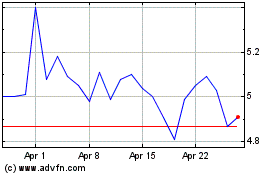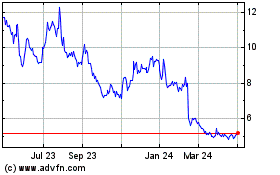Aurinia Pharmaceuticals Inc. (NASDAQ: AUPH) (Aurinia or the
Company), announced today the acceptance of four poster
presentations at the annual American College of Rheumatology
Convergence (ACR) 2024 taking place in Washington, D.C., November
14-19. The data highlight the need for additional screening for
lupus nephritis (LN), a serious manifestation of systemic lupus
erythematosus (SLE), and reinforce the clinical importance of
LUPKYNIS® (voclosporin), a second generation calcineurin inhibitor
(CNI), for the treatment of adults with active LN.
“The data we are presenting at ACR highlight the pivotal role
the rheumatology community must play in diagnosing and managing
lupus nephritis. Rheumatologists are on the frontlines of ensuring
early detection through routine screenings and of managing LN
appropriately with LUPKYNIS, which is backed by robust clinical and
real-world evidence,” said Dr. Greg Keenan, Chief Medical Officer
of Aurinia.
New real-world demographic data highlight high prevalence of
LN among people with SLE
Using the American Rheumatology Network (ARN) electronic medical
records database to understand potential renal involvement and
possible signs of LN, the study included 8,631 SLE patients
receiving care from community rheumatologists over a five-year time
period. The analysis found that 62% of these SLE patients had
ICD-10 coding or clinical laboratory measurements suggestive of LN.
Of the patients with suspected LN, 97% had an eGFR assessment,
compared to 66% and 62% of patients who had a protein assessment by
urine test strip or urine protein, respectively. Additionally, 40%
of the patients with suspected LN had an ICD-10 code specifically
for LN, compared to 60% with ICD-10 codes indicating kidney
conditions, eGFR decrease, or proteinuria.
“The overwhelming majority of people living with SLE show signs
of potential kidney involvement. However, our analysis suggests
that many SLE patients are not receiving proper kidney screenings,
and that LN is under-recognized and under-coded. A more proactive
approach, including regular screening for proteinuria, is crucial
for earlier detection and treatment of LN to minimize irreversible
kidney damage,” said Dr. Nehad Soloman, lead study author and
board-certified rheumatologist.
Rates of Sustained, Complete Renal Response with Long-Term
Use of LUPKYNIS in LN
An analysis from the Phase 3 AURORA 1 and 2 studies highlighted
the long-term efficacy of LUPKYNIS in people with LN. This study
focused on a new efficacy endpoint, sustained complete renal
response (SCRR), defined by the United States Food and Drug
Administration (FDA) as achieving a complete renal response (CRR)
at 12 months in AURORA 1 and at all study visits in the 2-year
AURORA 2 continuation study. Significantly more LUPKYNIS patients
achieved SCRR compared to patients receiving placebo. The SCRR
endpoint was included in an FDA-approved label update for LUPKYNIS
earlier this year.
Additional studies to be presented at ACR assessed the
effectiveness of tools aimed at measuring patient-reported outcomes
using data from the AURORA clinical program.
Following is the complete guide to Aurinia’s accepted
abstracts at ACR 2024:
Title: Validity, Reliability and
Responsiveness of Lupus Impact Tracker and LupusPRO: AURORA
Trial Authors: Meenakshi Jolly, Matt Truman, Ronald
Flauto, Kathryn Dao Date: Saturday, November 16, 2024
Time: 10:30 a.m. – 12:30 p.m. ET Abstract Number:
0661
Title: Rates of Sustained Complete
Renal Response with Long-term Use of Voclosporin in AURORA 2
Authors: Ernie Yap, Matt Truman, Cynthia Auguste, Vanessa
Birardi, Greg Keenan Date: Sunday, November 17, 2024
Time: 10:30 a.m. – 12:30 p.m. ET Abstract Number:
1545
Title: Patient Reported Outcomes
Analyses from AURORA 1 Clinical Trial: Lupus Impact Tracker and
LupusPRO Authors: Meenakshi Jolly, Matt Truman,
Ronald Flauto, Kathryn Dao Date: Sunday, November 17, 2024
Time: 10:30 a.m. – 12:30 p.m. ET Abstract Number:
1538
Title: Characterizing the
Population with Suspected Lupus Nephritis in Care of a Community
Rheumatology Network Authors: Nehad Soloman, Jawad
Bilal, Romy Cabacungan, Scott Milligan, Andrew Sharobeem, John
Tesser, Henry Leher Date: Monday, November 18, 2024
Time: 10:30 a.m. – 12:30 p.m. ET Abstract Number:
2415
About Lupus Nephritis Lupus nephritis (LN) is a serious
manifestation of systemic lupus erythematosus (SLE), a chronic and
complex autoimmune disease. LN affects approximately 120,000 people
in the U.S. and disproportionately affects women and people of
color. People living with LN have high unmet needs and often face
significant barriers to optimal care. If poorly controlled, LN can
lead to permanent and irreversible tissue damage within the
kidney.
Medical guidelines recommend that all SLE patients receive
routine LN screenings at every visit. Guidelines also note that
delaying LN diagnosis has profound prognostic repercussions. Yet,
research shows that approximately 50% of SLE patients are not
screened for LN and 77% of people with LN go untreated. Aurinia is
committed to improving health outcomes for people living with LN by
educating patients and providers on the critical need for routine
screening and transformative therapies that can help improve health
outcomes.
About LUPKYNIS LUPKYNIS is a second generation
calcineurin inhibitor (CNI) with a dual mechanism of action, acting
as an immunosuppressant through inhibition of T-cell activation and
cytokine production and promoting podocyte stability in the kidney.
The AURORA Clinical Program, comprised of the AURORA 1 pivotal
trial and AURORA 2 extension trial, demonstrated the importance of
LUPKYNIS plus standard of care to preserve kidney health in
patients with active LN without reliance on chronic high-dose
glucocorticoids. It is the only clinical program to include three
years of LN treatment and follow-up with mycophenolate mofetil
(MMF) and steroids.
About Aurinia Aurinia Pharmaceuticals is a fully
integrated biopharmaceutical company focused on delivering
therapies to people living with autoimmune diseases with high unmet
medical needs. In January 2021, the Company introduced LUPKYNIS®
(voclosporin), the first FDA-approved oral therapy dedicated to the
treatment of adult patients with active lupus nephritis. Aurinia is
also developing AUR200, a differentiated, potential best-in-class
therapy for autoimmune diseases that targets both BAFF (B-cell
Activating Factor) and APRIL (A Proliferation-Inducing Ligand).
INDICATION AND IMPORTANT SAFETY INFORMATION
INDICATION
LUPKYNIS is indicated in combination with a background
immunosuppressive therapy regimen for the treatment of adult
patients with active lupus nephritis (LN).
Limitations of Use: Safety and efficacy of LUPKYNIS have not
been established in combination with cyclophosphamide. Use of
LUPKYNIS is not recommended in this situation.
IMPORTANT SAFETY INFORMATION
BOXED WARNINGS: MALIGNANCIES AND SERIOUS INFECTIONS
Increased risk for developing malignancies and serious
infections with LUPKYNIS or other immunosuppressants that may lead
to hospitalization or death.
CONTRAINDICATIONS: LUPKYNIS is contraindicated in
patients taking strong CYP3A4 inhibitors because of the increased
risk of acute and/or chronic nephrotoxicity, and in patients who
have had a serious/severe hypersensitivity reaction to LUPKYNIS or
its excipients.
WARNINGS AND PRECAUTIONS
Lymphoma and Other Malignancies: Immunosuppressants,
including LUPKYNIS, increase the risk of developing lymphomas and
other malignancies, particularly of the skin. The risk appears to
be related to increasing doses and duration of immunosuppression
rather than to the use of any specific agent.
Serious Infections: Immunosuppressants, including
LUPKYNIS, increase the risk of developing bacterial, viral, fungal,
and protozoal infections, including opportunistic infections which
lead to serious, including fatal outcomes.
Nephrotoxicity: LUPKYNIS, like other calcineurin
inhibitors (CNIs), may cause acute and/or chronic nephrotoxicity.
The risk is increased when CNIs are concomitantly administered with
drugs associated with nephrotoxicity. Monitor eGFR regularly.
Hypertension: Hypertension is a common adverse reaction
of LUPKYNIS therapy and may require antihypertensive therapy.
Monitor blood pressure regularly.
Neurotoxicity: LUPKYNIS, like other CNIs, may cause a
spectrum of neurotoxicities: severe include posterior reversible
encephalopathy syndrome (PRES), delirium, seizure, and coma; others
include tremor, paresthesia, headache, and changes in mental status
and/or motor and sensory functions. Monitor for neurologic
symptoms.
Hyperkalemia: Hyperkalemia, which may be serious and
require treatment, has been reported with CNIs, including LUPKYNIS.
Concomitant use of agents associated with hyperkalemia may increase
the risk for hyperkalemia. Monitor serum potassium levels
periodically.
QTc Prolongation: LUPKYNIS prolongs the QTc interval in a
dose-dependent manner when dosed higher than the recommended lupus
nephritis therapeutic dose. The use of LUPKYNIS in combination with
other drugs that are known to prolong QTc may result in clinically
significant QT prolongation.
Immunizations: Avoid the use of live attenuated vaccines
during treatment with LUPKYNIS. Inactivated vaccines noted to be
safe for administration may not be sufficiently immunogenic during
treatment with LUPKYNIS.
Pure Red Cell Aplasia: Cases of pure red cell aplasia
(PRCA) have been reported in patients treated with another CNI
immunosuppressant. If PRCA is diagnosed, consider discontinuation
of LUPKYNIS.
Drug-Drug Interactions: Avoid co-administration of
LUPKYNIS and strong CYP3A4 inhibitors or with strong or moderate
CYP3A4 inducers. Co-administration of LUPKYNIS with strong CYP3A4
inhibitors is contraindicated. Reduce LUPKYNIS dosage when
co-administered with moderate CYP3A4 inhibitors. Avoid use of
LUPKYNIS with strong or moderate CYP3A4 inducers.
ADVERSE REACTIONS
The most common adverse reactions (≥3%) were glomerular
filtration rate decreased, hypertension, diarrhea, headache,
anemia, cough, urinary tract infection, abdominal pain upper,
dyspepsia, alopecia, renal impairment, abdominal pain, mouth
ulceration, fatigue, tremor, acute kidney injury, and decreased
appetite.
SPECIFIC POPULATIONS
Pregnancy: Avoid use of LUPKYNIS.
Lactation: Consider the mother’s clinical need for
LUPKYNIS and any potential adverse effects to the breastfed infant
when prescribing LUPKYNIS to a lactating woman.
Renal Impairment: LUPKYNIS is not recommended in patients
with baseline eGFR ≤45 mL/min/1.73 m2 unless benefit exceeds risk.
If used in this population, reduce LUPKYNIS dose.
Hepatic Impairment: For mild or moderate hepatic
impairment, reduce LUPKYNIS dose. Avoid use with severe hepatic
impairment.
Please see Prescribing Information, including Boxed Warning, and
Medication Guide for LUPKYNIS.
View source
version on businesswire.com: https://www.businesswire.com/news/home/20241115824168/en/
Media & Investor Inquiries: Andrea Christopher
Corporate Communications & Investor Relations Aurinia
Pharmaceuticals Inc. achristopher@auriniapharma.com General
Investor Inquiries: ir@auriniapharma.com
Aurinia Pharmaceuticals (NASDAQ:AUPH)
Historical Stock Chart
From Nov 2024 to Dec 2024

Aurinia Pharmaceuticals (NASDAQ:AUPH)
Historical Stock Chart
From Dec 2023 to Dec 2024
